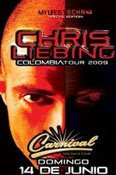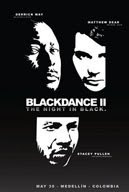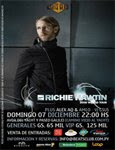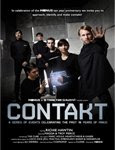Conocido como Barem, su nombre real es Mauricio Barembuem.
Tiene 24 años de edad, nacido en Buenos Aires (Argentina).
Habla perfectamente Inglés, que no es de extrañar, ya que gasta la mitad de su tiempo en Berlín.
Barem es actualmente uno de los dj Minimal-Techno mas populares, Ha sido también nominado como Mejor Artista mínimal en el Beatport Music Awards y su remix de Luka & Lazo ‘Dust No.4’ ha sido nominado para Mejor Remix de 2007.
Como comenzaste en la música electrónica?
En el 2001 comencé con un poco de todo pero nada serio, realmente no hice nada oficial hasta el 2003 cuando empecé a tocar.
La gente de Buenos Aires no entendía mucho la música que tocaba. Ellos veían el minimal como algo experimental.
When did things start to blow up for you?
I have Someone Else to thank for the exposure. He came to Buenos Aires and loved the sound of a few local producers here and put out a free compilation at the beginning of 2006 on UnfoundSound.
He started to pass our names around and before long Richie Hawtin started digging my music.
In 2006, I went on tour to Europe for two weeks, but ended up staying for two months in Berlin because I loved it so much.
Because my profile had built up quite a bit, I started hooking up with the right people in Berlin.
It was really amazing, because all these people knew who I was thanks to Shawn [Someone Else] and Richie Hawtin, who supported my music.
I had also just had a release on Minus which opened a lot of doors.
I was just 22 back then, so it was a really amazing experience.
Berlin is a really good base town to keep in control of networking.
There are so many good events and so many big artists come to the city.
Now Buenos Aires is more of an escape for me. When I’m in Berlin it is all about the music.
But when I come back here, I’m returning to my homeland. All my friends are here. I sleep a lot and eat good food.
Did you ever imagine that you’d have releases on Minus and be playing with Richie Hawtin? How does it feel to be nominated as Best Minimal Artist / Best Remix in the Beatport Music Awards [BMAs]?
It was my goal to get big, but it was more of a dream. I don’t really realise the goals I’ve achieved so far, because it all happened so fast. I started touring for fun in 2006. Now it’s 2008 and all this crazy shit has happened in two years.
I’ve had 150 gigs in Europe, so this is like a big roller coaster ride. It’s going up but I’m not looking down. I would freak out if I ever looked back.
The BMAs is exciting, definitely.
I knew my remix of Dust No.4 would be big, but not that big. I actually wrote it for festivals.
I’ve had 150 gigs in Europe, so this is like a big roller coaster ride. It’s going up but I’m not looking down. I would freak out if I ever looked back.
The BMAs is exciting, definitely.
I knew my remix of Dust No.4 would be big, but not that big. I actually wrote it for festivals.
How is the Buenos Aires scene developing?
Things are getting better, definitely.
Many top artists are coming here and in a few years, it’s gonna be huge. It won’t so much of an escape for me probably.
The scene now is so much bigger than it was last year as there is a lot more interest from locals.
There are new kids in the scene like 18 and 22-year olds.
In December 2007, 5000 people came to see me play with Richie Hawtin and Magda.
That’s crazy, a couple of years ago Richie was nothing in Argentina.
A few years ago, the scene was super competitive. There were older DJs trying to stop young DJs from progressing.
There was quite a backwards mentality - you can’t play this music, you can’t DJ like that.
So it was impossible to build a name for yourself.
But many of us just thought fuck it, we’ll just send our music outside of Argentina and South America.
We built all our network outside. We were nobodys in Buenos Aires and somebodys elsewhere.
But now the minimal revolution has finally come here, and suddenly we’re big here.
Another change that has benefited the scene here is the digital revolution.
Before, buying vinyl was super expensive, about $16 US per record.
Sometimes you used to order a record, and it wouldn’t arrive until three months later.
Now it’s different and the scene in Argentina is more connected to the outside world.
How has your music changed since 2006?
My first record was in 2005 and it was minimal.
My music used to be super shuffled and quite similar to Jeff Samuel or Ryan Crosson’s music.
Now it’s more square. There’s no more shuffle and it’s more organic and less machine-sounding.
I don’t think about the music I make, I just make what I feel.
In the last two years, I’ve learnt a lot about sound. Sub bass levels and super high frequencies.
My music now has a much wider range of frequencies.
You mainly play live, don’t you?
Yeah I play live a lot. There are not too many club sets that are headliner live slots, but I’ve managed to get my fair share.
Promoters usually want me to play live.
I use a laptop and midi controller, the UC-33. I only play my own tracks when I play live.
I don’t really wanna push my DJ career.
When I play live though, I try to sound like a DJ by using loops and a mixer.
What’s your plans for 2008? Any albums planned?
I hope to do an album, but I want to do something original and unique like Onur Ozer or Guido Schneider.
They both did super original albums and I’m scared of trying to do an album as good as them.
I don’t want to do a crappy album, it has to take me to the next level.
I’ve just done a remix of Kate Simko’s new track for Ghostly International, which I’m quite excited about too.
I can definitely tell you I have no plans to start a label.
One final question: Can you name some Buenos Aires talent that you think should get more exposure.
I want to support local talent. There’s at least 10 guys from here who release good music regularly like:
Franco Cinelli Seph Gurtz Jorge Savoretti Dilo Omar Salgado Funzion
Also check out Igloo Records and Unlock Recordings.
See more:http://www.beatportal.com




















DEJANOS TU COMENTARIO